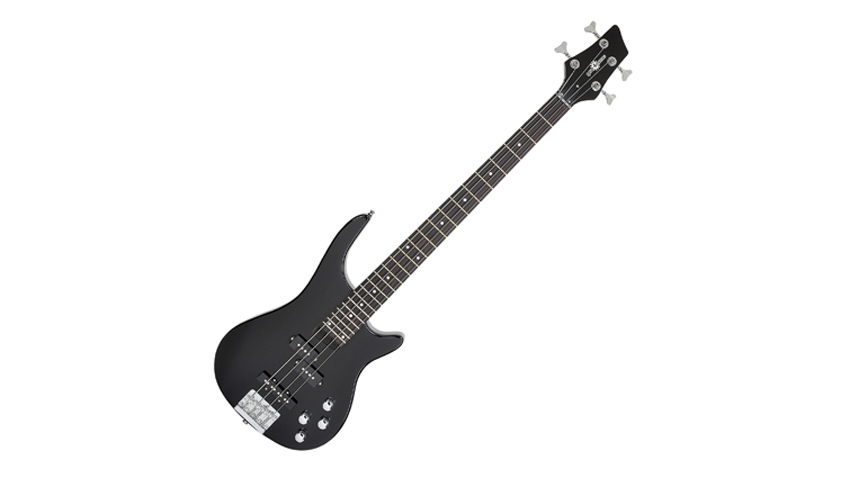MusicRadar Verdict
This bass is good enough to get you gigging and should suit seasoned players on a budget, too.
Pros
- +
Good all-round sounds. Excellent value for money.
Cons
- -
The action is may be slightly on the high side for some tastes, but this is easily remedied.
MusicRadar's got your back
What's the most important instrument you'll buy in your life? Arguably, it's not the custom-shop creation you treat yourself to after years of dedicated playing, but your first guitar.
If you start with a bass that sounds bad and is difficult to play, chances are you won't play it all that often. So it's important to get going with something decent, but not prohibitively expensive.
At just under £100, the Electric RS-40 Bass Guitar is squarely aimed at the beginner's market. But what can you expect for your money?
Build
First up, let's look at the basics. The basswood body has two wide-scooped cutaways, designed for easy upper fret access. Although that's unlikely to be a priority for beginners, it helps playing comfort, as does the relatively light weight of the instrument.
The bolt-on maple neck has a rosewood fretboard and a broad but fairly shallow D-profile that is easy to get to grips with. You might want to tweak the neck relief to bring the action down a touch, but it is perfectly playable straight out of the box and shouldn't tax learners' fingers too much. The 864mm (34-inch) scale length emulates that of the Fender Precision model, so it's a well-proven choice.
Meanwhile, at the headstock end, the two-a-side sealed tuners do their job effectively and without fuss.
Turning to pickups, the RS-40 is fitted with a Precision-style split single-coil pickup nearest the neck and a Jazz-style single-coil by the bridge, which gives you some useful tonal options.
As with many basses, there's no pickup selector, but each pickup has its own dedicated volume and tone controls, so it's a case of blending those settings to get the tone you want; the front and rear volumes are uppermost from the player's perspective.
Sounds
Plugging in, we start by rolling the volume of the bridge pickup right down, so the neck pickup can be heard in isolation. We're rewarded with a fairly bright, classic tone. The new strings are probably skewing the sound towards the treble side, but rolling the treble right off on the neck pickup yields a rounded, soulful vintage bass tone. With the treble on full, it verges towards the rockier, contemporary side of the tonal spectrum.
Next, it's time to bring the bridge pickup into play. Turning the neck pickup right down for the moment, we try out the bridge on its own. As expected, it's angular and a little spikier in tone than the neck pickup, and would work well for punky fuzz-tone workouts. Nonetheless, it's not as useful as the split pickup for general playing.
Blending both pickups together gives a raft of variations on the basic tonal theme of each pup, but, for our taste, rolling off a little treble yields the most pleasing sounds.
Jamming with the RS-40 is easy and enjoyable. It's perhaps not the classiest sounding bass we've ever used, but it's capable, playable and has a street price that's equivalent to around five packets of strings, and that's not to be sniffed at.
Don't underestimate the worth of decent entry-level instruments such as the RS-40. They are how musicians get started in music, and you won't outgrow this one in a hurry. The RS-40 is perfectly good enough to gig with and has no serious vices. The review model is a metal-ready, gloss black finish, but a more classic sunburst option is also available.
Actually, we reckon the RS-40 is better suited to contemporary rock and pop styles than vintage sounds, but it's versatile enough to do justice to most types of music. Overall, it's a good deal of bass for the money.
MusicRadar is the internet's most popular website for music-makers of all kinds, be they guitarists, drummers, keyboard players, DJs or producers.
GEAR: We help musicians find the best gear with top-ranking gear round-ups and high-quality, authoritative reviews by a wide team of highly experienced experts.
TIPS: We also provide tuition, from bite-sized tips to advanced work-outs and guidance from recognised musicians and stars.
STARS: We talk to artists and musicians about their creative processes, digging deep into the nuts and bolts of their gear and technique. We give fans an insight into the actual craft of music-making that no other music website can.
“If they were ever going to do the story of Nero, probably the most decadent of all the emperors, they would have to use Roy Thomas Baker”: Tributes to the legendary producer of Queen, Alice Cooper, Journey and more
“Built from the same sacred stash of NOS silicon transistors and germanium diodes, giving it the soul – and snarl – of the original”: An octave-fuzz cult classic returns as Jam Pedals resurrects the Octaurus
What’s the buzz? Meet Yellowjacket, Cherry Audio's recreation of EDP’s trend-setting Wasp from 1978











